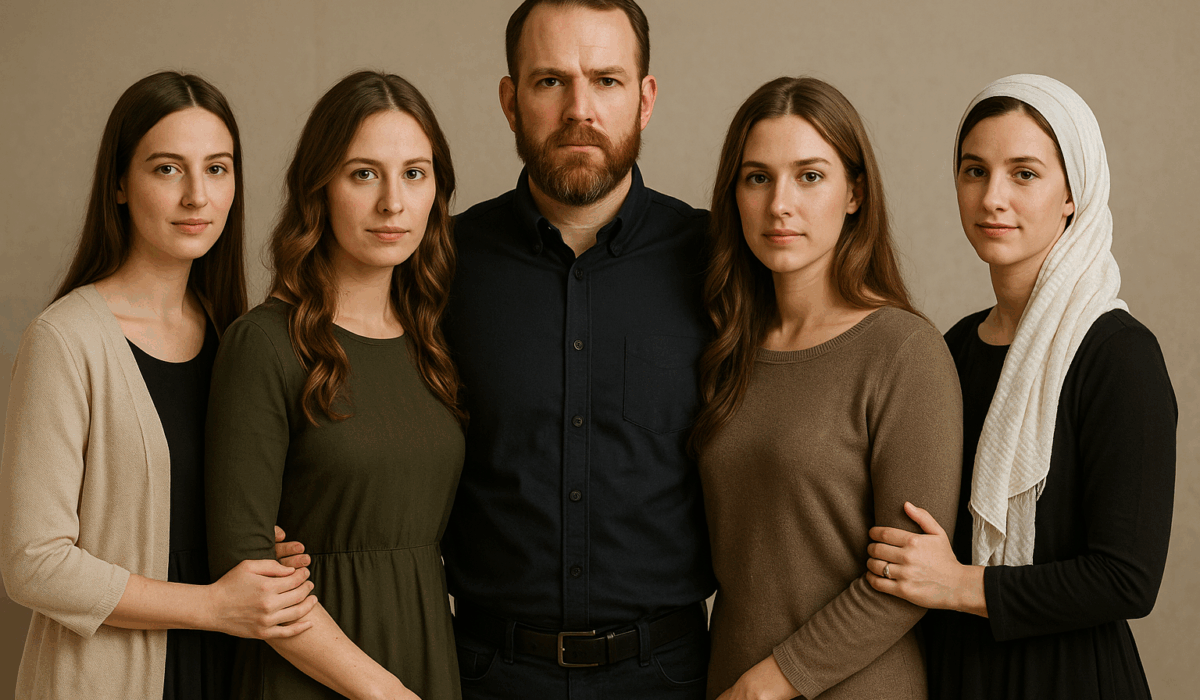By Lord Redbeard
“Bold Foundations for Biblical Patriarchy, Masculinity, and Household Dominion”
I. Introduction: Restoring a Forgotten Standard
The modern world shudders at the sound of the word polygyny. Conditioned by feminist propaganda, humanist ideals, and centuries of post-Biblical moral dilution, the Western church recoils from a truth its own patriarchs once walked in freely. But the Scriptures have not changed. The God of Abraham, Jacob, and David is still the same God. The standard of family life that built early civilizations, raised righteous dynasties, and established generational dominion under Yahweh has not been abrogated.
Polygyny—one man, multiple wives—is not a sin, but a structure. Not a deviation, but a design. It is neither lawless nor lustful. It is biblical. It is historical. And it is necessary if the people of God are to multiply, build, and rule in this age of collapse.
This post is not for the timid. It is for men who fear God more than the opinions of modernity. It is for women who long to build homes instead of careers. It is for families that seek to resurrect the household of faith—not as a poetic metaphor, but as a living, breathing embassy of the Kingdom of Heaven.
II. The Biblical Foundation for Polygyny
A. The Patriarchs and Their Wives
To reject polygyny is to reject the very foundation of the covenantal family. Scripture plainly shows that many of the holiest and most favored men of God were polygynous:
- Abraham, the father of faith, had Sarah and Hagar (Genesis 16:3), and later took Keturah (Genesis 25:1).
- Jacob, the namesake of Israel, had four wives: Leah, Rachel, Bilhah, and Zilpah (Genesis 29–30).
- Moses, the great lawgiver, had more than one wife (Exodus 2:21; Numbers 12:1).
- David, a man after God’s own heart, had many wives (2 Samuel 5:13).
- Solomon, though later ensnared in idolatry, initially ruled with strength from a polygynous household.
- Joash, Rehoboam, Jehoiada the priest, and others in the Old Testament carried on the practice without rebuke.
What is significant is not simply that these men were polygynous, but that God Himself gave them these wives, or blessed them within this structure. In 2 Samuel 12:8, the Lord says to David through the prophet Nathan:
“And I gave thee thy master’s house, and thy master’s wives into thy bosom… and if that had been too little, I would moreover have given unto thee such and such things.”
Not only was polygyny not rebuked—it was a gift from God.
B. The Law of God Regulates, Not Forbids
Deuteronomy 21:15–17 offers laws regulating the inheritance rights of the firstborn son from a less favored wife, clearly implying polygyny. Exodus 21:10 commands that if a man takes another wife, he must not diminish the food, clothing, or marital rights of the first. Again, regulation—not prohibition.
God is not the author of confusion. If polygyny were sinful, it would be forbidden. Yet no such command exists. The New Testament, too, is silent in its condemnation. Christ condemned divorce (except for fornication), not polygyny. Paul gave pastoral counsel for bishops and elders to be “the husband of one wife” (1 Timothy 3:2), not because polygyny is sin, but because the position required focused leadership and clear testimony.
III. Historical Endorsements of Polygyny
A. The Ancient Hebrews
Polygyny was the norm for centuries in Israel. It was seen not as promiscuity but as a mark of divine blessing. A man who could support multiple wives was seen as one who had dominion, wealth, and leadership ability. Wives were not trophies; they were builders of houses, mothers of tribes, and stewards of domestic life.
B. The Early Church Fathers
Contrary to the sanitized narratives of modern Christianity, several early Church leaders acknowledged the legitimacy of polygyny in the Old Testament without condemning it outright. Tertullian, Augustine, and others noted its role in redemptive history. Augustine even wrote that the patriarchs practiced polygyny by divine command or permission.
The universal prohibition of polygyny arose not from Scripture, but from Roman law and Greco-Roman ethics. By the fourth century, the church had become infected with Hellenistic dualism and anti-body asceticism. Celibacy was exalted. Sexual union, even in marriage, was frowned upon. And thus, polygyny, as a fruit-bearing, dominion-driven model, was outlawed by religious culture—not by God.
C. The Reformers and Beyond
Martin Luther acknowledged that polygyny was not inherently sinful. In a letter, he stated:
“I confess that I cannot forbid a man to marry several wives, for it does not contradict the Scripture.”
Luther even permitted a prince to take an additional wife under specific circumstances.
The Anabaptists, who returned to Biblical literalism, also practiced polygyny in some communities. In the early colonial frontier of America, polygyny was occasionally practiced among devout Christians where demographic imbalance and survival dictated practical, family-oriented solutions.
IV. Polygyny and Dominion
A. Fruitfulness Requires Structure
God’s first command to man was to be fruitful and multiply (Genesis 1:28). Polygyny supercharges this command. In a time when men are outnumbered by women, and many men are unwilling or unqualified to lead, the righteous man should consider it his duty to take more than one wife—not out of lust, but out of love for the Kingdom.
Each godly wife can be a builder of a godly household. Each womb, under righteous headship, becomes a seedbed of the next generation of dominion bearers. This is not about numbers alone—it is about culture, order, and the transfer of wisdom, authority, and inheritance.
B. Rebuilding Generational Houses
The modern world produces sterile units called “nuclear families”—fragile, unsustainable, and often broken. The Biblical household, in contrast, was a multigenerational estate. Polygyny enables the expansion of such households. As each wife builds her own tent within the same dominion domain, the patriarch’s authority multiplies—not by bureaucracy, but by blood and covenant.
Imagine a household with three wives: one managing the kitchen, another schooling the children, a third sewing garments or overseeing trade. Each has a realm. Each has her own children. Each contributes to the economy and expansion of the household. The husband, as patriarch, oversees, shepherds, and provides. This is no harem. This is hierarchy, holiness, and heavenly order.
V. Addressing Common Objections
A. “It’s Not Legal”
Neither was preaching the gospel in first-century Rome. We obey God rather than men (Acts 5:29). The legality of a practice under a pagan government is no test of righteousness. Many who say, “It’s not legal,” are silent when sodomy is legalized and Christian speech criminalized. Let us not use Caesar’s sword to measure Yahweh’s standards.
Civil marriage licenses are not required for covenantal unions before God. Righteous polygyny can exist outside of state registration. God sees what man refuses to recognize.
B. “It’s Not Loving to Women”
On the contrary, true polygyny provides covering, provision, and purpose to more women than monogamy alone. In a world filled with fatherless children, divorced mothers, and sexually abandoned women, a righteous man who embraces polygyny rescues—not exploits—the feminine.
Instead of loneliness, she receives community. Instead of aimless careerism, she builds a household. Instead of fornication or state dependence, she thrives under a man’s covenant and God’s law.
C. “It Will Lead to Jealousy”
So can monogamy. Human nature is fallen. But Scripture never makes emotional volatility the measure of obedience. Instead, it demands that men rule well and that women be sanctified in submission. Leah and Rachel struggled, yet they built the house of Israel. Jealousy is to be conquered, not coddled.
Mature wives in a godly home learn to honor each other. They bear different strengths. The fruit of meekness, service, and love among sister-wives can become one of the most beautiful pictures of Christian sisterhood.
VI. Qualifications of the Polygynous Man
A. He Must Be a Patriarch
Polygyny is not for the immature or undisciplined. It is for a man who rules well his house, provides without fail, and understands his spiritual role as priest, protector, and provider.
A man must not enter polygyny to gratify the flesh but to build the Kingdom. He must know each wife, care for her, shepherd her heart, and guide her children. His authority must be matched by wisdom and discipline.
B. He Must Be Just and Merciful
The polygynous man must show no partiality. He must be a man of order, ensuring that each wife is properly honored, provided for, and disciplined according to God’s Word. He is not a king for luxury’s sake, but a servant-king who models Christ’s care for His Bride.
VII. Women Who Thrive in Polygyny
A. Builders, Not Competitors
The woman suited for polygyny does not see her life through the lens of feminist rivalry. She sees her fellow wives as sisters in the household of God. She does not war for attention. She builds. She multiplies. She rules her children and her duties with grace and strength.
B. Women of Faith and Vision
The polygynous wife must walk by faith, not by the approval of the world. She understands that being covered by a righteous man is better than pursuing the emptiness of careerism or dating culture. She is a woman of vision—one who sees herself as part of a dynasty, not just a romance.
VIII. Polygyny in a Time of Collapse
The Western world is dying. Birthrates are collapsing. Marriages are failing. Feminism has turned women into men and men into cowards. But in the midst of the ruins, the righteous household can rise.
Polygyny is not a trend. It is a tool—a weapon in the hand of the patriarch to rebuild what was destroyed. It allows the righteous to shelter more women, raise more godly children, and multiply in a land that worships death.
IX. Conclusion: Rise and Build
The day is coming when Christian men will be forced to choose between cultural comfort and biblical obedience. The future will not belong to those who play by the world’s rules. It will belong to those who build households of strength, vision, and dominion.
Polygyny, rightly ordered under God’s law, is not merely permissible. It is powerful. It is not just ancient—it is anointed. And it is not optional for those who truly seek to multiply the household of faith and stand against the tide of collapse.
Let the righteous rise. Let the households expand. Let the patriarchs build.
“Thy wife shall be as a fruitful vine by the sides of thine house: thy children like olive plants round about thy table.”
—Psalm 128:3



